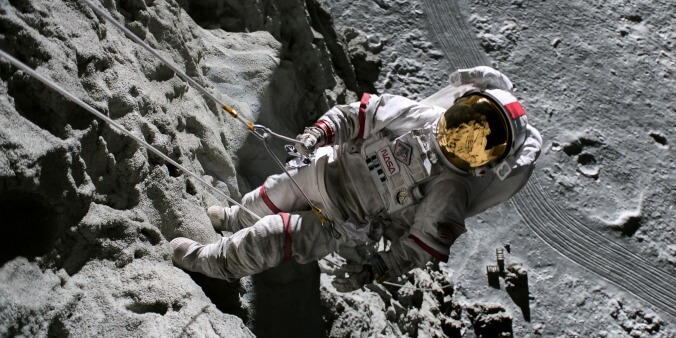Late-hour thrills and hard-won progress fuel season 2 of For All Mankind


Early in its first season, the sci-fi drama For All Mankind sparked as much wonder with its stunning visuals as its revisionist premise: a world in which an early setback in the space race fueled technological innovation along with social change in the United States. As the season unfolded, the series remained too tied to established history to really take flight. Progress moved in leaps and bounds at Mission Control and in NASA labs, as astronauts like Ed Baldwin (Joel Kinnaman), Gordo Stevens (Michael Dorman), Danielle Poole (Krys Marshall), and Ellen Waverly (Jodi Balfour) set up a lunar camp before season’s end. But more sweeping changes, including a shift in focus to characters like Danielle, who were sidelined by NASA in our timeline, remained merely on the horizon. And the alternate history crafted by Ronald D. Moore and his co-creators, Ben Nedivi and Matt Wolpert, moved stylishly, if not so boldly, in the same direction as more straightforward period pieces.
Season two of For All Mankind is set in 1983, 14 years after the climactic divergence in history that saw the U.S.S.R. plant a flag on the lunar surface ahead of the U.S. That early defeat only served to galvanize the space program at NASA, which, in the show’s present, is widely supported by this country’s government and populace. Although federal funding is no issue, NASA generates its own revenue stream via patents, which leads to a funny moment in which a NASA official tries to curry favor with the Department Of Defense by offering a working printer. Margo Madison (Wrenn Schmidt), the first woman in Mission Control, is now the first female administrator of the agency (fun fact: she has no real-life counterpart). Ed now heads up the astronaut office, which leaves him plenty of time for spaghetti dinners with his wife, Karen (Shantel VanSanten), and daughter, Kelly (Cynthy Wu). Space shuttles launch with the regularity of a train schedule. Correspondence is shared in minutes via digital mail or “d-mail,” and video conferencing is available everywhere. The future’s so bright, everyone’s in shades, including the latest Jamestown crew, who are out for a sunrise walk as the season begins.
Just as quickly as it establishes this happy tableau, For All Mankind reminds us it’s far from the complete picture. A newsreel in the premiere episode, “Every Little Thing,” playfully brings us up to speed with this alternate history. The Cold War is heating up, as both the U.S. and Russia view the moon as a potential battlefront. Ronald Reagan is already in his second presidential term and is just as focused on stockpiling weapons and maintaining superpower status. Although it still courses with optimism, For All Mankind isn’t aiming to be comfort TV. The show’s adherence to our history, which felt stymying in the first season, coalesces in the second—all the tech wizardry in the world can’t overhaul the past. American exceptionalism continues to drive xenophobic policies, a recession still looms, and an icy detente seems all but destined to explode in global strife.
If For All Mankind began as a rallying cry in the midst of one of the most demoralizing and dangerous presidencies, it now serves as a reminder of just how incremental and hard-won progress can be. The opportunities afforded one individual or group remain scarce elsewhere. The fight—whether for social justice, or less nobly, lunar dominance—is just beginning. That approach is a double-edged sword, though, as it leads the first half of the season to feel more like table-setting than the engrossing next chapter in Moore’s latest time-traveling narrative. The squabbles and personal victories of the Baldwin and Stevens families remain front and center, and the writers once again introduce compelling new characters only to put them on the narrative back burner. Kelly struggles to emerge from the twin shadows of her brother Shane’s tragic death and her parents’ discontent, even as she sets out to follow in Ed’s footsteps to the Naval Academy and learn more about her adoption. Now an adult and a brilliant engineer in her own right, Aleida Rosales (Coral Peña) is once more plucked from obscurity by Margo (a fact the latter doesn’t let the former forget).
Even more perplexing is the inconsistent presence of Dani Poole, the first Black astronaut. Dani seemed poised to represent the future of NASA, but her place in space exploration history was complicated, to say the least, by her selflessness 10 years ago. In helping Gordo hide his breakdown at the Jamestown base, she became a cautionary tale to other astronauts: A photo of Dani with her arm in a sling is captioned “Don’t let this happen to you” by new recruits. Dani’s backstory is explored further in a midseason episode that seems to take inspiration from Gil Scott-Heron’s “Whitey On The Moon,” and the back half of the season offers more exciting opportunities for this veteran astronaut. But there’s a lack of resolution, especially regarding Dani’s past sacrifice.
For All Mankind does make some worthwhile return trips in its storytelling. The cast continues to play well off each other, even as the characters’ diverging paths create great distance. Ellen Wilson’s (née Waverly) public image, her evolution from the “girl who caught the tank” to NASA bigwig, contrasts starkly with her personal life. She’s haunted by Deke’s (Chris Bauer) admonition about her queerness, or possibly already aware of the Reagan administration’s homophobia (the HIV/AIDS epidemic isn’t mentioned, but the administration’s real-life dismissal of the health crisis should loom in the viewer’s mind). Ellen’s ascension in the ranks creates an interesting tension between personal gains as a queer woman and actual representation, and Balfour handles the double life (and doubled burdens) with grace. Along with Ellen, Ed and Margo wrestle with the militarization of the space program. Even the crumbling Baldwin marriage and the remnants of Gordo and Tracy’s fairy-tale pairing (which fills a void in the tabloids, since there’s no royal wedding between Charles and Diana in this version of history) speak to the soaring divorce rate in the early ’80s and shifting family dynamics. Molly Cobb (Sonya Walger) represents a different kind of heartbreak, but she’s got plenty of fight left in her.
The second half of season two is much more rewarding overall, as the design created by Moore et al. (including executive producer Maril Davis) reveals itself. Although the 55-plus-minute run times suggest otherwise, there’s an efficiency to For All Mankind’s storytelling. What looked like loose threads three episodes ago weave themselves into two suspense- and spectacle-filled final episodes. These episodes are the most fun and exciting, in part because you can sense all the fun that was had in putting them together. Everything from Star Trek (The Original Series and the subsequent films) to The Thing to Die Hard informs the final two outings of the season—and it mostly works, though you can’t help but wish some of the bombast had been unleashed earlier. Tonally, this marks a departure from the more meditative episodes that set up the season, but a somber coda reminds us of what remains at stake. Although its imagination occasionally stalls, the second season of For All Mankind eventually comes together to offer a thrilling journey through sci-fi drama.